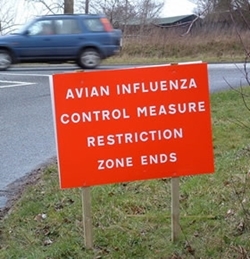
On 3 March a case was identified on a premises near Redgrave, Suffolk, during investigations following a recent nearby case. Due to the unacceptable high risk and to contain the possible spread of avian flu, the UK’s Deputy Chief Veterinary Officer confirmed that proactive culling of around 55,000 birds was to take place. The premises will then be cleansed and disinfected, further reducing the risk to other birds. A 3km Protection Zone and a 10km Surveillance Zone are already in place following the previous case in the area.
On 24 February a case was confirmed in a small flock of chickens at a farm near Haltwhistle, Northumberland. The flock contains about 35 birds. A full investigation is under way to determine the source of the infection.
On 13 February a case was confirmed at a poultry premises near Redgrave, mid-Suffolk. The affected premises is estimated to contain approximately 23,000 birds. A 3km Protection Zone and a 10km Surveillance Zone have been put in place around the infected premises to limit the risk of the disease spreading.
On 27 January a case was confirmed in a flock of pheasants at a farm in Wyre, Lancashire. This case was proactively identified as part of a routine investigation of premises traced as a result of confirmation of the disease in Lancashire earlier this week. There is a business link between the two premises. The flock is estimated to contain approximately 1,000 birds.
On 26 January a case was confirmed at a turkey rearing farm near Boston, Lincolnshire. The flock is estimated to contain approximately 19,500 birds.
On 24 January, a case was confirmed in a flock of farmed breeding pheasants at a premises in Preston, Lancashire. The flock is estimated to contain approximately 10,000 birds. A number have died and the remaining live birds at the premises are being humanely culled. A full investigation is under way to determine the source of the infection. A 3km Protection Zone and a 10km Surveillance Zone have been put in place around the infected premises.
The government has joined with several leading countryside organisations including the GWCT to issue important advice guidelines on gamebirds and avian flu, which all those involved with gamebirds should read.
To help protect birds from avian flu, the Prevention Zone has been extended to 28 February. The Prevention Zone was initially put in place last December after some birds and poultry tested positive for avian flu in mainland Europe.
Since then an outbreak was confirmed in turkeys at a farm in Lincolnshire on 16 December, another case was confirmed in a backyard flock in Carmarthenshire on 4 January, and also in a small backyard flock near Settle in North Yorkshire on 6 January. On 16 January, a case was confirmed in a flock of turkeys at a farm in East Lindsey, Lincolnshire. There is unlikely to be a direct link to the previous case in Lincolnshire, but a full investigation is under way to confirm this. The flock is estimated to contain approximately 6,000 birds.
In all cases a 3km Protection Zone and a 10km Surveillance Zone were put in place around the infected premises. The advice from Public Health England is that the risk to public health from the virus is very low and the Food Standards Agency has made clear that bird flu does not pose a food safety risk for UK consumers.
Whilst stringent biosecurity measures are put in place, it is crucial that those in the countryside remain vigilant and report any suspected cases. Guidance on how to spot avian flu and what to do if you suspect it is available from Defra here.
There are currently no restrictions on shooting activities and shoots can continue as normal. However, the GWCT advises that:
- Shoots near the areas that have confirmed cases should practice extra vigilance
- Keepers of captive gamebirds (e.g. overwintering breeding flocks) must minimise the risk of contact with wild birds where indoor housing is not practicable
- Be vigilant and look out for signs of sickness/disease/dead birds (captive, free living and wild birds) and report any concerns to the Defra Helpline (03459 33 55 77)
- Ensure that captive flocks of 50 or more birds (chickens, ducks, partridges, pheasants, etc) are registered with Defra
- Ensure high levels of biosecurity
Avian influenza – what is it and how is it spread?
Bird flu, or avian flu, is an infectious type of influenza that spreads among birds. The disease spreads from bird to bird by direct contact or through contaminated body fluids and faeces. Avian influenza isn’t an airborne disease nor is there evidence that any recent strain of avian influenza has been able to spread directly between people.
More information
Notes to editors
The Game & Wildlife Conservation Trust – providing research-led conservation for a thriving countryside. The GWCT is an independent wildlife conservation charity which has carried out scientific research into Britain’s game and wildlife since the 1930s. We advise farmers and landowners on improving wildlife habitats. We employ more than 60 post-doctoral scientists and other research staff with expertise in areas such as birds, insects, mammals, farming, fish and statistics. We undertake our own research as well as projects funded by contract and grant-aid from government and private bodies.
For information, contact:
Eleanor Williams
Telephone: 07592 025476
Email: press@gwct.org.uk